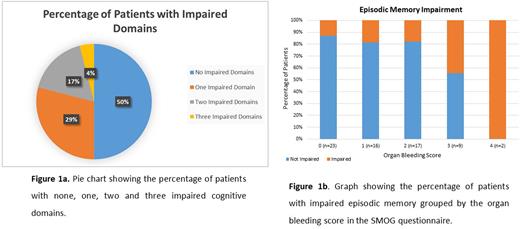Abstract
Background Immune thrombocytopenia (ITP) is an autoimmune condition characterized by a low platelet count (<100 x 109/L). Patients with ITP have an increased risk of bruising and bleeding (mainly skin and mucosal). A study by Cooper et al published in 2020 showed that 43% of adult ITP patients have occult cerebral microbleeds (CMBs) on susceptibility-weighted magnetic resonance imaging (SW-MRI). The clinical and prognostic significance of CMBs has not been established but some studies have shown they are associated with cognitive impairment.
ITP was believed to be an isolated blood disease, but more recent studies demonstrate impaired quality of life with symptoms including fatigue, memory and concentration problems. This may be suggestive of cognitive impairment. There is only one study by Frith et al that has reported cognitive impairment in adult patients with ITP. The findings of this study are important, although cognitive impairment was measured using a self-reported cognitive failures questionnaire, which may be less robust.
Aims The primary objectives of the study were to establish the prevalence of cognitive impairment and which cognitive domains are impaired in patients with ITP. The secondary objective was to investigate any link between ITP disease parameters, presence of CMBs and cognitive impairment.
Methods Ethical approval was granted by the London-Surrey Borders Health Research Authority (reference number: 13/LO/1365). Patients with ITP who attend the Imperial College Healthcare NHS ITP center and who had a nadir platelet count ≤ 30 x 109/L at any time during their disease course were recruited to the study. Patients underwent cognitive testing using an automated neuropsychological test battery (CANTAB), completion of SMOG (skin, mucosae, organs) bleeding questionnaire, cerebral SW-MRI to identify CMBs and a full blood count. CANTAB is a validated and automated software tool used in clinical practice and research to assess cognitive impairment. Five key cognitive domains (episodic memory, executive function, processing speed, working memory and attention) were assessed using different tasks. Z-scores standardized for age, sex and education level were generated. Based on the z-scores, the patients' cognitive performance was categorized as impaired or not impaired.
Clinical data (including date of diagnosis, nadir platelet count, number of ITP treatments received and co-morbidities) was collected from medical records.
One sample T-Tests were used for continuous data while Pearson's Chi Square Test and Fisher's Exact Test were used for categorical data. Multiple comparisons corrections were not performed.
Results A total of 69 patients completed CANTAB cognitive testing and MRI. The median age was 40 years (range 19-88), median age at diagnosis was 31 years (range 4-83), median duration of disease was 69 months (range 5-535), median nadir platelet count was 5 x 109/L (range 0-30), median platelet count at time of test was 95 x 109/L (range 4-653) and median ITP treatments received were 4 (range 0-14). Forty-six percent of patients had other co-morbidities, 65% were female and 52% of patients were receiving ITP treatment at the time of cognitive testing.
Of the 69 patients tested, 50% (95% CI [37, 62]) had at least one impaired cognitive domain (Figure 1a). The percentage of patients with impairment per domain were 22% episodic memory, 19% executive function, 16% processing speed, 13% working memory and 3% attention. Two patients could not finish the episodic memory CANTAB task; therefore, their score for this domain could not be generated.
Higher organ bleeding score was associated with impaired episodic memory (p=0.048) (Figure 1b). Older age at diagnosis, age at time of cognitive test and number of ITP treatments received were associated with impaired episodic memory (p=0.03, p=0.08 and p=0.04 respectively). There was no correlation between the presence or number of CMBs and impaired cognition.
Conclusion This is the first study to objectively measure cognitive impairment in patients with ITP. It showed that a significant proportion (50%) of patients with ITP suffer from cognitive impairment, with episodic memory being most affected. These results suggest that ITP is not just a 'low platelet' disease. Correlation between ITP disease parameters and impaired cognition requires further investigation in a larger cohort.
Disclosures
Bussel:Rigel: Consultancy, Membership on an entity's Board of Directors or advisory committees; Rallybio: Consultancy, Membership on an entity's Board of Directors or advisory committees; AstraZeneca: Other: Data and Safety Monitoring Board; Janssen: Consultancy, Membership on an entity's Board of Directors or advisory committees; Argenx: Consultancy, Membership on an entity's Board of Directors or advisory committees; Sobi: Consultancy, Membership on an entity's Board of Directors or advisory committees; Novartis: Consultancy, Membership on an entity's Board of Directors or advisory committees, Speakers Bureau; UCB: Consultancy, Honoraria, Membership on an entity's Board of Directors or advisory committees, Other: Data and Safety Monitoring Board; Amgen: Consultancy, Membership on an entity's Board of Directors or advisory committees. Cooper:UCB: Consultancy, Honoraria; Argenyx: Consultancy, Honoraria; Sobi: Consultancy, Honoraria; Griffols: Consultancy, Honoraria; Principa: Consultancy, Honoraria; Sanofi: Consultancy, Honoraria; Rigel: Consultancy, Honoraria, Research Funding; Novartis: Consultancy, Honoraria, Research Funding.
Author notes
Asterisk with author names denotes non-ASH members.


This feature is available to Subscribers Only
Sign In or Create an Account Close Modal